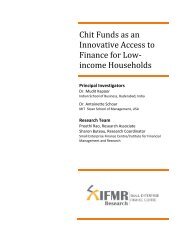Government of India Volume I: Analysis and Recommendations
Government of India Volume I: Analysis and Recommendations
Government of India Volume I: Analysis and Recommendations
Create successful ePaper yourself
Turn your PDF publications into a flip-book with our unique Google optimized e-Paper software.
MICRO-PRUDENTIAL REGULATION<br />
PRINCIPLE 4. Any obligation imposed on regulated persons should be consistent with the<br />
benefits, considered in general terms, which are expected to result from the imposition <strong>of</strong><br />
that obligation.<br />
The incentives <strong>of</strong> regulators are usually asymmetric in favour <strong>of</strong> excessive caution;<br />
regulators may not get much credit for maintaining the safety <strong>and</strong> soundness, but are<br />
likely to be subjected to much criticism if the number <strong>of</strong> failures cross an acceptable level.<br />
Consequently, regulators may tend to be too cautious <strong>and</strong> impose excessive costs on<br />
regulated persons <strong>and</strong> the economy.<br />
PRINCIPLE 5. The desirability <strong>of</strong> promoting competition, access <strong>and</strong> innovation, <strong>and</strong> minimising<br />
the adverse effects <strong>of</strong> regulatory actions on competition, access <strong>and</strong> innovation.<br />
Competition in financial markets is likely to have a significant positive impact on<br />
growth. Competition <strong>and</strong> innovation <strong>of</strong>ten go h<strong>and</strong> in h<strong>and</strong>, since competition creates<br />
the incentive for innovation. The strength <strong>of</strong> competition is likely to influence the efficiency<br />
<strong>of</strong> financial intermediation <strong>and</strong> the quality <strong>of</strong> financial products.<br />
Certain instruments <strong>of</strong> micro-prudential regulation, such as licensing, may have a<br />
direct impact on competition, innovation <strong>and</strong> access in the system. As an example, it is<br />
possible to use rules for entry in ways that close down entry altogether for years on end.<br />
Going beyond entry barriers, instruments such as capital requirements, if not properly<br />
used, could impede innovation <strong>and</strong> access.<br />
The Commission believes that competition <strong>and</strong> high quality micro-prudential regulation<br />
can go h<strong>and</strong> in h<strong>and</strong>. Indeed, the Commission’s reading <strong>of</strong> research <strong>of</strong> international<br />
contexts suggest that high quality supervision in banking enhances stability <strong>and</strong> competition.<br />
The Commission emphasises the pursuit <strong>of</strong> both goals: <strong>of</strong> high competition <strong>and</strong><br />
high quality micro-prudential regulation. A sound approach to regulation <strong>and</strong> supervision<br />
is an integral part <strong>of</strong> a pro-competitive stance, through which there is no adverse<br />
impact on competition.<br />
The Commission also asserts that safety <strong>and</strong> soundness can be pursued in a manner<br />
that minimises impact on access, innovation <strong>and</strong> competition. For example, hypothetical<br />
situations could be imagined where simple leverage limits <strong>and</strong> risk-based systems <strong>of</strong><br />
capital adequacy achieve similar regulatory results though having a differential impact<br />
on innovation <strong>and</strong> competition. The Commission recommends that concerns <strong>of</strong> stability<br />
<strong>and</strong> impact on access, innovation <strong>and</strong> competition be considered in t<strong>and</strong>em.<br />
PRINCIPLE 6. The need to ensure that regulatory actions are carried out in a manner that<br />
is least detrimental to competitiveness <strong>of</strong> <strong>India</strong>’s financial system.<br />
The Commission does not take a position on financial globalisation as such. The<br />
financial system provides the pathways through which foreign capital gets infused in the<br />
economy. The Commission simply notes that if policy makers continue to look to foreign<br />
capital for assistance in meeting the development <strong>and</strong> financing needs <strong>of</strong> the economy,<br />
micro-prudential regulation should be assessed in part by how such regulation affects<br />
the ability <strong>of</strong> the country to attract such capital.<br />
Regulations enhancing safety <strong>and</strong> soundness <strong>of</strong> institutions should help the country<br />
attract financial capital, because investors are averse to losing capital due to instability<br />
in the financial system. But if micro-prudential regulation over-reaches, then this can<br />
negatively affect the return on capital. There is some evidence that global banks transfer<br />
resources away from markets with highly restrictive financial regulation.<br />
The Commission also notes that the viability <strong>of</strong> an onshore financial system is an<br />
important measure <strong>of</strong> international competitiveness. Difficulties in regulation can lead<br />
to financial intermediation involving <strong>India</strong> to move <strong>of</strong>fshore. The Commission recommends<br />
balancing two competing concerns. On the one h<strong>and</strong>, rules preventing the use<br />
FINANCIAL SECTOR LEGISLATIVE REFORMS COMMISSION 65



